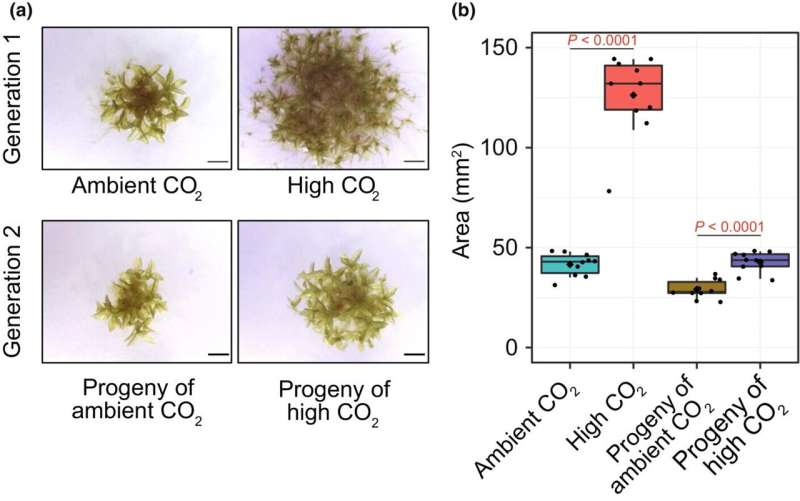Research uncovers how plants pass ‘memory’ of high carbon dioxide to their offspring

New research lead by Keith Slotkin, Ph.D., a member of the Donald Danforth Plant Science Center, opens the door for scientists to equip plants with the tools they need to adapt to rising levels of carbon dioxide (CO2), high heat, and other stressors associated with climate change. The study is published in the journal The New Phytologist .
The research reveals that transgenerational inheritance occurred via DNA methylation, the process by which plants “mark” DNA without changing the code of the DNA itself, providing future generations’ cells with information on how to “read” that DNA. The process was identified in two key plant species, moss and Arabidopsis, and creates the opportunity to prepare plants for growth under stress by exposing the parent plant to similarly unideal growing conditions.
“We now understand the specific DNA methylation factors that enable the memory of the stress response,” said Slotkin, “so in the future we can manipulate this process to generate plants that are permanently resilient to that stress.”
With this knowledge, parent generations of plants can be intentionally grown in a controlled environment under stressful conditions that will push them to their limits, giving their progeny the benefit of increased resilience to that stressor. For example, a major crop like corn could be grown in extreme heat, at the brink of what it can survive, and the seed collected from that corn would result in a highly heat-resistant corn crop that could be grown in a location that is experiencing rising temperatures.

This unusual memory of the environment is unique to plants and distinct from how animals pass a genetic trait like eye color or height from one generation to the next.
Lacking the ability to run away or seek shelter, plants must adapt to the elements to survive. Stressors such as drought or extreme temperatures induce a stress response that lasts beyond the initial exposure to the stressor; for example, a plant that survives extreme heat early in its growing cycle will be primed to endure extreme heat again later on, even if the heat is more extreme the second time around.
Fascinatingly, this increased resilience doesn’t end with that individual plant’s life cycle—the plant can pass that behavior on, transmitting a cellular memory of stress to its offspring.
“Any clue that the parent plant can give to its offspring about the environment will help the offspring respond most efficiently to whatever they might experience,” said Danforth Center principal investigator Keith Slotkin, Ph.D. “It is ‘what doesn’t kill you makes you stronger’ in action, across generations.”
This phenomenon has been studied before, but the new study specifically focused on transgenerational inheritance of the CO2 response in two important plants: moss and Arabidopsis. Studying how plants react to high levels of CO2 is particularly important as climate change threatens to alter plant growth on a global scale. Confirming transgenerational inheritance of high CO2 adaptations in moss is significant because it is evolutionarily distant from other plants that have been investigated, suggesting that this behavior is a broad rule across a wide variety of plants. Arabidopsis, a commonly studied model plant, allowed the team to closely study the mechanisms responsible for establishing the memory of stress and propagating that memory on to the next generation.
“Only at the Danforth Center could we have this diverse scientific expertise already assembled and then match this with the cutting-edge plant growth infrastructure that allowed us to image plants from above, hour by hour, as they grew at different CO2 levels,” said Postdoctoral Associate Kaushik Panda, Ph.D., the lead author on the study.
The team is currently studying other important crops like rice and tobacco to collect data on their behavior. They are also pursuing an even deeper understanding of what is going on at the molecular level of these processes.
More information:
Kaushik Panda et al, The plant response to high CO2 levels is heritable and orchestrated by DNA methylation, New Phytologist (2023). DOI: 10.1111/nph.18876
Citation:
Research uncovers how plants pass ‘memory’ of high carbon dioxide to their offspring (2023, April 11)
retrieved 11 April 2023
from https://phys.org/news/2023-04-uncovers-memory-high-carbon-dioxide.html
This document is subject to copyright. Apart from any fair dealing for the purpose of private study or research, no
part may be reproduced without the written permission. The content is provided for information purposes only.
For all the latest Science News Click Here
For the latest news and updates, follow us on Google News.

